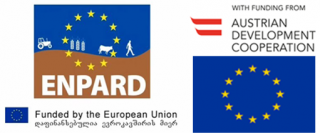When Saint Nino, one of Georgia’s most venerated saints, traveled to Mtskheta back in the fourth century, she stopped to erect a grapevine cross in Foka, a small settlement on the shores of Lake Paravani some 2000 meters above sea level. Saint Nino must have traveled during the summer since, even today, Foka is very difficult to reach for about 6 months of the year. Heaps of snow block all major access roads during the long and cold winter.
In 1992, as Georgia was going through the most painful period in its recent history, six young Georgian women decided to make Foka their home. The first 10 years or so were about physical survival: digging their houses deep into the ground to withstand strong winds and temperatures in the -15-25ºC (-5-13ºF) range; collecting enough wood to keep themselves warm; growing and storing potatoes and other basic foodstuffs; and managing a difficult relationship with their Armenian neighbors.
By early 2000s, different winds started blowing in Foka. The first business idea was to revive the local tradition of cheese making, which was brought to Samtskhe Javakheti by catholic missionaries back in the 18th century. While failing to make it into the mainstream of Georgian cuisine, the so-called ‘blue cheese’ (a version of Roquefort) survived in Samtskhe Javakheti’s alpine zone because of its superior storability. Storability is what made this cheese a good choice for the isolated Foka community.
After a bit of local experimentation (and a study tour in France), the blue cheese became a commercial success with tourists visiting the area and in Tbilisi. And since the long winter days were good for learning and experimentation, what followed was a flurry of creativity and innovation. More than 20 cheese varieties in most surprising colors, shapes, and flavors; jams combing local (and not only) berries, spices and herbs; honey; truffles and chocolates; vodka; unrefined oils and vinegar; cloisonné enamel, jewelry and ceramics.
The menu of products suggests great marketing skills as well total fascination with trying out new things. How about black-currant jams with almond nut, fig with ginger, or banana and carrots with lemon? Should you care for chocolate, ever tried the dried oranges and gingelly flavor? What may be thyme-flavored vodka is marketed as Wild Alpine thyme aged with alcohol. And then, of course, there are all the cheeses…
When visiting Foka for the first time in summer 2015, I was captivated by the stunning aesthetics of the place. The deep sense of love, peace and harmony emanating from every little detail here – the stones of the buildings, the wood of the furniture, and the cute paper packaging – was clearly something to be shared with others. And so, a couple months later I was back with a group of ISET’s agricultural economics students and faculty.
When viewed from the economic perspective, the seven-strong pack of Foka women are organized as a small agribusiness. During the short alpine summer they produce honey and run a little dairy farm – the source of milk for their cheese factory. The highlands provide them with berries, flowers and herbs which they use to spice up all of their food products. Yet, instead of maximizing individual profits they seek community development and harmony, both inside the group and among them and their immediate environment. All of their profits are reinvested into new project ideas and activities.
WHEN I FIND MYSELF IN TIMES OF TROUBLE…
A strong sense of common destiny and of commitment permeates everything that happens at Foka. The oldest among the six sisters – the leader of the pack – was only 24 when the group settled in Foka. She started out as a student of biophysics in the prestigious Moscow State University but discontinued her studies after a year of soul searching. At the urging of her parents, she did complete her degree in Tbilisi. By then, however, she already knew her destiny would take her elsewhere.
Her natural charisma and talent were the glue that kept the group together through all the difficult years. She radiated light and energy on her colleagues and the environment. The group acquired many friends, including those in the Georgian expat community, who helped with money, business ideas and connections.
Even local villagers came to appreciate the hard working women and their leader. Little by little they were convinced to allow their children to come near and be taught arts and crafts, foreign languages (though not Georgian!) and computer skills. Ironically, the tipping point arrived when one of the village girls won a 1000 GEL prize in national essay competition! Once trust was established, the locals started eagerly imitating their neighbors by planting trees (something hitherto unthinkable in Samtskhe Javakheti), and even trying new kinds of farming and business activities – beekeeping, hospitality services, etc. Many changes are already visible for any passerby, such as new roofs and better taken care of public spaces. Other improvements – village-level cooperation on milk collection and, most certainly, children’s education, while quite tangible, would require a more discerning eye.
* * *
In case it was not clear, the Foka sisters are nuns, and their Mother Mary is in fact called Mother Elizabeth. While they have the ability, they are not on a mission to build a business empire. Rather, they remain a very small community of seven women trying to balance hard work with learning and spirituality. Yet, their achievements should shine on all of us, giving strength to desolate communities and desperate families, and inspiring the Georgian nation as a whole. Let it be!
The author is president with the International School of Economics at Tbilisi State University. I would like to acknowledge research assistance by Nino Kakulia
 The article was first published in Georgia Today - Georgia's leading English language newspaper, published twice weekly.
The article was first published in Georgia Today - Georgia's leading English language newspaper, published twice weekly.





















Comments
Let it be! Let all Georgian villages be inspired by Poka example!
As a synonym to Let it be! (dae asec ikos) Georgians often use the phrase Let the God make it happen! (gmertma qnas).
Georgia absolutely needs rural innovations similar to the one described in this article. But we cannot wait for the God to make it happen. It took these nuns around two decades (though 1990s offered much less opportunities than the contemporary Georgia) to become successful. Being divine might also helped them a bit.
What can be taken from the Poka example is the role of an inspired leader (Mother Elisabeth) in this success story. It is important to recognize the role of leadership in community developments. Georgian villages do not lack opportunities but leadership is essential for mobilizing and coordinating the available resources. Agricultural and rural extension workers could seek for such leaders within different communities and intensively work with them to speed up the progress.
I could not agree more. There are plenty of talented people across Georgia's countryside, but instead of doing good for the communities in which they belong most of them are doing good for themselves. And I would not blame them. The manner in which Georgia has "privatized" its communities in 1990s does not give people many opportunities to do things together. Communities that continue to stick together because of a common craft such as is the case in Shrosha (where ceramics is the glue) are a huge exception. And even in Shrosha people cooperate in a very peculiar manner (http://iset-pi.ge/index.php/en/iset-economist-blog-2/entry/the-case-of-shrosha)